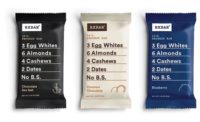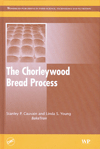Focus On The Family
By Dan Malovany
As it celebrates its centennial, Franz Family Bakeries sets in motion the gears needed to stick around for another 100 years as one of the nation’s premiere independent and privately owned baking companies.
Harold Klein couldn’t help but feel nostalgic — and perhaps a little bit of dejá vu — during his recent tour of the Franz Bakery in Portland, Ore. A half century earlier, Klein, then owner of his mom-and-pop grocery store in Salem, Ore., had been invited to visit the bakery with his wife and children, ages 9, 10 and 12, to celebrate the company’s first 50 years in the business.
As Portland Mayor Tom Potter recently declared April 11 “Franz Day,” officially kicking off the baking company’s 100th anniversary, Klein stood there again, this time with the TV lights blazing and his three much-older children, who are now parents and even grandparents in their own right.
“[The plant] was very familiar in many ways,” recalls the 88-year-old, now a resident of Rogers, Ark., “but it is a lot more automated than before.” Then again, some things haven’t changed. “I still remember the dough coming down the chutes,” he says. “That was pretty much the same.”
As so often is the case, a chance encounter resulted in a twist of fate. Two years ago, Ron McKnight, Franz’s vice president of sales operations, had been visiting Wal-Mart’s headquarters when he decided to take one of his sales managers on a tour of the Bentonville, Ark., visitor center, which houses a huge collection of Wal-Mart memorabilia.
A greeter at the center, Klein asked the two men to sign in and noticed that McKnight worked in Portland. After he approached McKnight, Klein pulled out his wallet and showed him a card that said, “Honorary Franz Vice President, 50th Anniversary, 1956.” Talk about customer loyalty.
“It totally freaked me out,” McKnight remembers.
McKnight told Klein that the bakery was celebrating its centennial in 2006 and invited him to join the celebration.
“I never believed that I would see Harold again,” he says.
Much to McKnight’s surprise, Klein followed up on the invite … and the rest is history.
Family of Bakeries
Back in the 1950s, when Klein first toured the bakery, the company was known as United States Bakery, operated one plant, primarily served a small market around Portland and was one of a couple dozen independent baking companies flourishing throughout the Pacific Northwest. But even back then, consumers called the bakery by the Franz name.
Today, United States Bakery remains its corporate name. In fact, its Web site is www.USBakery.com. However, in 2002, the company officially began referring to itself as Franz Family Bakeries to bring its family of regional powerhouse brands, such as Franz, Snyder’s and Williams’, under one umbrella, McKnight says. The Franz Family Bakeries moniker began appearing in all advertising and promotions, as well as on all packaging, letterhead, business cards, uniforms, trucks and business forms.
To Bob Albers, the company’s chairman and CEO, making the change just made sense. For years, the company even had been answering its phones under the Franz name. Why not be consistent in all of its marketing and promotional efforts?
“We didn’t want to sound like a big corporation,” he says. “People knew us as ‘Franz Bakery.’ We’re United States Bakery doing business as Franz Bakery.”
As in many parts of the nation, the Northwest is home to a bevy of artisan bread producers and limited-line specialty wholesalers. Because of industry consolidation, Albers notes, Franz is the only surviving large independent baker in the region that still sells a full line of baked goods.
The $250 million bakery has six plants that produce everything from bread, buns, hearth breads, rolls, English muffins and bagels to cookies, muffins, doughnuts and other sweet goods.
In all, 90% of the 1,200 product varieties it sells are produced in-house and direct-store delivered (DSD) on 650 routes to retail, in-store bakery and foodservice customers from the Canadian border down to northern California and along 1,000 miles from the Pacific coastline across to Big Sky Country in Montana.
Although it serves major cities such as Portland and Seattle, a significant portion of Franz’s market is Main Street America. In many of these outlying areas, such as Eureka, Calif., Franz is the only source for baked goods.
“When we go into a small town, they want the same products as the big cities do, and we’re the bread man who brings you everything,” Albers explains. “Sure, we can be beaten, but it would take you a lifetime to establish many of these routes that we have out there.”
Despite consolidation in the Northwest, competition in the baking industry remains fierce. That’s because private label producers command a 50% share of the region’s entire bread market. As a result, Franz Family Bakeries must fight for shelf space along with other major wholesalers and upstart specialty bakeries in the bread aisle. That’s something Franz does quite well. Independent bakeries don’t survive for 100 years by taking a backseat to anyone.
“We’ve got good people, Albers says. “They’re street fighters. If you punch us in the nose, we’re going to punch you back in the nose, because we fight for every inch of space we have.”
To survive, independent bakers not only have to be scrappy, but nimble, as well.
“We can be in and out with a new product faster than a big company can sit down and think about one,” Albers adds. “We always believe first in the market gets the lion’s share.”
To create ownership with its consumers, the wholesaler also plays up its hometown quality and freshness, McKnight adds. “Baked Fresh in the Northwest” is the brand’s theme. Consumers think of the Franz plant in Portland, the Williams’ Bakery near Eugene, Ore., the Snyder’s plant in Spokane, Wash., and the Gai’s facilities in Seattle as their local bakeries. Although it uses the Franz name on super-premium breads and other baked goods throughout the region, the company chooses to keep the Snyder’s, Franz and Williams’ brands on sandwich breads and cluster buns in their regional markets.
“We recognize the value of those brands in the marketplace,” notes Marc Albers, president and COO. “The bags are similar in design to the Franz line, but their [neighborhood] brand names are still out there. Fourteen years after acquiring Williams’ [bakery], the Williams’ name is still out in the marketplace because we try to take advantage of those brands’ strength.”
The Hometown Bakery
To heighten its hometown bakery image, Franz Bakery strengthens its ties to the community by grooming the next generation of consumers. It does this by visiting schools and giving virtual presentations of the bakery and by offering weekly tours of its plant, handing out mini-loaves and other memorabilia to students as they leave. McKnight estimates that the bakery touches base with some 12,000 students annually.
As the local bakery, the company routinely donates products to charities and food banks. Twenty years ago, each of the major baking companies in the region donated to a different cause. That’s no longer the case.
“We’re the only ones who do it anymore to the food banks,” Albers says. “You have to be a corporate citizen. We exceed our charitable donation every single year, way beyond what we can write off.”
Another pillar to its sustainability over the years has been its commitment to product quality, especially the sponge-and-dough process. In the 1970s, when continuous mix or batter-whipped bread spread across the nation, Franz was tempted to jump on the bandwagon. It even purchased the equipment to produce the fluffy smooth white bread that had no holes and, many may argue, little or no flavor. For that reason, the company didn’t pull the trigger.
“They stuck to the sponge-dough system, which, in my opinion, is a superior loaf of bread,” Albers says.
More recently, when extended shelf life (ESL) was all the rage a few years ago, Franz explored the new ingredient technology. For many bakers, the goal of ESL was to reduce stales and cut distribution by extending the shelf life of its products.
“That was never our focus,” Albers says.
While Franz uses some ESL technology to improve its products’ quality and shelf life, Franz bread still has the shortest code in the market, with five days on variety bread and 72 hours on white bread.
To maintain quality and streamline its operations, the company continues to reinvest in its operations. Last year, it spent $3 million refurbishing its bread line in Portland and installing new packaging equipment. Currently, the company is finishing up construction on a $42 million bakery in Springfield, Ore. (See “Playing a Full House.”)
Unlike a public company, Franz can adjust capital expenditures and dividends to its stockholders depending on its performance during the fiscal year. Having such flexibility allows the wholesaler to thrive in good times and ride out the bad.
“You’re going to have downturns,” Albers notes. “We just survived three years of Atkins and the low-carb craze. We saw a dip in tonnage and in sales. I don’t know what the next thing is going to be, but it will happen.
“The sustainability of a company, particularly of a bakery, is being able to survive the bad times,” he adds. “It doesn’t make any difference how good the good times are. If we have a particularly good year, we try to put it back into equipment. It’s absolutely paramount that your plants stay as modern as they can and stay in good condition.”
Franz Family History
Consistent leadership also provided a hallmark for survival. Since its inception, Franz has had only three chief executives. In 1896, founder Engelbert Franz emigrated from Austria to work with his uncles, who owned United States Bakery in Portland. During his eight years at the bakery, he repaid his uncles for his travel expenses and sent for his brother Joseph to join him at the bakery.
In 1906, the two brothers purchased a small corner retail shop called Ann Arbor Bakery, and within two years, they made enough money to buy out their uncles’ bakery, fulfilling a dream of Engelbert Franz’s.
“As he was coming into New York with all of the other immigrants and seeing the American flag, he became a very patriotic person,” Albers says. “It was his desire to have a company called United States Bakery, and he took the colors off the flag — the red, white and blue — and that became the flagship design for Franz products.”
A few years later, Engelbert Franz obtained a $100,000 loan, which allowed him to build a plant on what is the current location of the Franz Bakery in Portland. Despite the Great Depression and two World Wars, the Franz bakery thrived, selling sliced bread in wax paper and developing a reputation as Portland’s hometown bakery.
After passing away in 1954, Engelbert Franz’s son, Joe Franz, became the company’s second chief executive and built the business into a Portland establishment.
In 1975, he hired Albers, who then worked for Continental Baking, as the bakery’s executive vice president and general manager.
“What the Franz family did was they built a very solid foundation,” Albers says. “They owned buildings, owned land and had cash. What they needed, and what I was able to provide for them, was knowledge of a bigger picture of the baking industry. What I brought to them was an outside-of-Portland picture.”
Albers’ vision involved creating a regional powerhouse to protect the company from being a victim of ongoing industry consolidation.
“The prime difference between the Franz family when I joined them and today is that they were a $9.5 million company back then,” he explains. “I think they did an excellent job at that time frame of the world. There were lots of independent bakeries along the West Coast, and most of them did well back then.
“None of them exists anymore,” he adds. “They’re all gone, except us, and the reason for that is — and I’m not smarter than those people — that I knew we had to get to a certain size to protect ourselves.”
Pieces of the Puzzle
From 1976 to 1986, when Albers became the company’s third president and CEO, Franz acquired seven regional bakeries throughout Oregon and Washington. During the period, the company also expanded the Franz Bakery, which now covers five city blocks.
It was only the beginning.
“I can remember Joe Franz once told me, ‘Why can’t you be satisfied? Why can’t we just sit back and enjoy what we have?’” Albers recalls. “And my point was, ‘Because somewhere five to 10 years down the road, we’re vulnerable. We’re not a critical size in territory and in volume to protect ourselves. We’re surrounded.’”
The acquisition pace continued after Joe Franz passed away in 1988. In 1989, Franz and Gai’s Northwest Bakeries joined forces to build Pacific Northwest Baking Co., a supplier of buns to a national quick-service restaurant chain. Then Franz acquired Williams’ Bakery in 1991, solidifying its southern flank. It next ventured into the cookie category with the purchase of McMinnville, Ore.-based Smith’s Cookie Co. in 1994.
However, just one piece of the puzzle was missing. There was a gaping hole in and around Seattle where Gai’s dominated the market.
Franz tried to buy it in the early 1990s, but the Gai family sold it to Specialty Baking Co., based in Deerfield, Ill. For five years, Franz tried to penetrate the Seattle market, losing money in the process.
“We had to force that issue up there to let them know we were a player,” Albers explains.
In 1997, Specialty Baking began its exit from the baking industry and sold Gai’s to Franz.
“That was the key to giving us the stability to complete against the majors in the industry,” Albers adds.
Maintaining Family Ties
Although the acquisitions now are under the Franz Family Bakeries umbrella, each bakery maintains its own family traits. Bakery awards are named after their founders. For example, recipients in the Snyder’s division receive the Horace Snyder Award for outstanding service.
“We have tried to maintain culture,” Marc Albers says. “You can’t go in there, take the name off the bakery and try to change everything. You let them keep their culture for a long time.
“When we bought Snyder’s, we let Snyder’s stay as Snyder’s,” he notes. “It’s the same with Williams’ and the same with Gai’s. I respect those people for starting their businesses, and I don’t want anybody to forget who these people are. They were the pioneers who got things started.”
Today, the company is starting to write the next chapter in its history as the executive team grooms the next generation to take over as part of a planned succession process.
In 2004, Marc Albers became only the fourth president in the company’s history, succeeding his 64-year-old father, who remains chairman and CEO. The younger Albers has spent 20 years in the business, starting out as a summer gofer in the garage shagging down broken route trucks. A graduate of the University of Oregon, he moved into sales, servicing the tough Seattle market prior to the purchase of Gai’s before moving up the ranks as sales manager, general sales manager and general manager of the Portland and Eugene plants, and, eventually, president.
“Bob, like everyone else, realized that we needed a succession plan,” Marc Albers explains. “A lot of companies don’t have a clearly defined succession plan, and it leaves a lot of things up in the air. Our company did spell out its succession plan [in 2004], and it gave everybody a little bit more stability and more at ease in the future.”
Other family members are involved in the company. Kim Albers-Nisbet, Marc’s sister, is vice president of Smith Cookie Co. and national sales for the company. She had been actively involved in building the Smith Cookie business for nearly a decade. Additionally, Todd Cornwell, vice president of account sales and marketing, is McKnight’s son-in-law.
To retain key managers, Franz issues shares in the business. Giving them a piece of the company rewards loyalty and creates ownership.
“If we hadn’t given shares to our key management people, there would be no retention,” Albers explains. “There’s no way I could have kept the qualified people here. We’re a family-based company, but we’re basically a privately-held baking company.”
For a half century, the company also has had a profit-sharing plan for its employees.
“It’s totally independent from the bakery, and we haven’t missed a 15% payment since its inception, and that was more than 50 years ago,” Albers adds.
As the company moves forward, Albers believes it’s in solid shape.
“One of the secrets to our success is how we manage debt,” he explains. “Today, we’re a debt-free company. If we had leveraged ourselves too high in the last 10 years, we’d be in trouble.”
The next few years, he suggests, will be critical for Franz and other independent bakeries as consolidation in the industry continues.
“I think it’s about survival of the fittest,” Albers says. “It’s the last-man standing syndrome. I think that bakeries that are here for the next five years will be able to stay for the next 20 to 30 years.”
As far as he’s concerned, Franz is positioned to be around for a long time. Call it cautious optimism.
“We didn’t build this company and spend all this time to hand it to somebody to take it down,” Albers says. “We have been careful and have assembled a team here where we have a lot of confidence that can carry this company for another 100 years.” SF&WB
At a Glance
Company: Franz Family Bakeries
Holding Co.: United States Bakery
Headquarters: Portland, Ore.
Annual Sales: More than $250 million
No. of Employees: 2,500
Products: More than 1,200 varieties of breads, rolls, buns, bagels, English muffins, cookies, doughnuts, sweet goods
Brands: Franz, Williams, Snyder’s, Gai’s, Seattle International, Bay City, Smith’s, New York Bagel Boys
Franchised Brands: Roman Meal, Aunt Hattie’s, Milton’s
Market: Direct-store distribution (DSD) in Wash., Ore., west to Mont., south to northern Calif. Also sell products in parts of Alaska and cookies beyond DSD territory
Distribution: 650 routes and 92 depots
Key Personnel
Chairman & CEO: Bob Albers
President & COO: Marc Albers
CFO: Jerry Boness
V.P. Sales Operations: Ron McKnight
V.P. Human Resource & Labor Relations: Jim Lockhard
V.P. Account Sales & Marketing: Todd Cornwell
V.P. Smith Cookie Co. & National Sales: Kim Albers-Nisbet
V.P. Information Systems: Jonathan Dolp
Corporate Controller: Keith VanEmmerik
V.P. Purchasing: Ken Waltos
V.P. Manufacturing: Barry Ware
That’s One Big Dog, uh, Bun
If you don’t toot your own horn, no one else will. Certainly, Franz Family Bakeries has the right to do this all summer long as it celebrates its 100th anniversary.
Besides, something like this happens only once in a century.
To commemorate the occasion, Franz Family Bakeries will participate in parades, serve barbecue luncheons throughout its market, hold parties at each of its bakeries, sponsor sporting events, celebrate the opening of its new $42 million bakery in Springfield, Ore., and make a record-breaking 100-ft. hot dog bun.
That’s one big bun.
“It’s one foot for every year that we’ve been in business,” notes Marc Albers, president and COO.
According to the company, the current record for the longest hot dog bun is 57 ft. On July 6, Franz will produce the 100-ft. hot dog bun in its Portland, Ore., bakery. After removing the front window to get it out of the bakery, the bun will be wheeled down to the city’s Pioneer Square and put on display the following day.
“We’ll feed anyone down there who wants a piece of the hot dog,” says Ron McKnight, vice president, sales operations.
Later in the month, in its largest market, Franz will do it again with another 100-ft. hot dog bun for the Bite of Seattle, which attracts more than 1 million people annually.
To promote its anniversary, Franz has developed radio commercials. Additionally, six bellybands that wrap around bread loaves will feature vintage photos from the bakery’s archives, along with short vignettes that highlight the bakery’s history and try to put it in perspective for consumers.
For instance, one bellyband takes a snapshot of life back in 1906, when Teddy Roosevelt was president, 43,000 cars were made, the “Big Quake” hit San Francisco, the Northwest celebrated the Lewis & Clark centennial, and “Engelbert Franz started baking the GOOD BREAD in Portland,” according to the company.
Others mention Joe Franz being born above the bakery, deliveries by horses in the old days and how the company now drives about 15,000,000 miles to get bread in stores. Another bellyband estimates that the company has made more than 5 billion lb. of dough over the years. Yet another one pinpoints what Franz considers the three biggest disasters of the last century.
“We’ve survived two World Wars, the Great Depression and the low-carb craze,” the bellyband reads. “Help us celebrate with a TOAST!”





